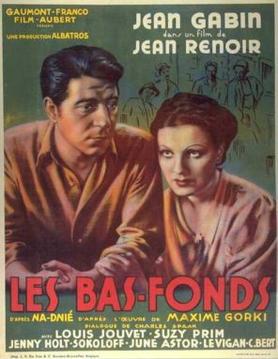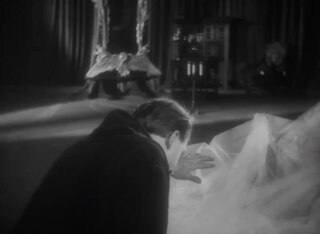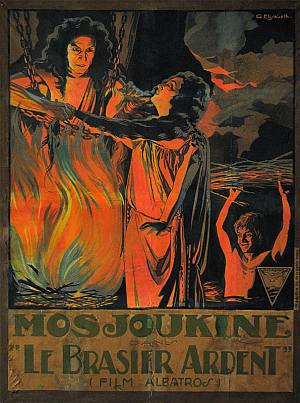
A Man and a Woman is a 1966 French romantic drama film directed by Claude Lelouch and starring Anouk Aimée and Jean-Louis Trintignant. Written by Pierre Uytterhoeven and Lelouch, the film concerns a young widow and widower who meet by chance at their children's boarding school and whose budding relationship is complicated by the memories of their deceased spouses. The film is known for its lush photography, which features frequent segues among full color, black-and-white, and sepia-toned shots, and for its music score by Francis Lai.

A femme fatale, sometimes called a maneater, Mata Hari, or vamp, is a stock character of a mysterious, beautiful, and seductive woman whose charms ensnare her lovers, often leading them into compromising, deadly traps. She is an archetype of literature and art. Her ability to enchant, entice and hypnotize her victim with a spell was in the earliest stories seen as verging on supernatural; hence, the femme fatale today is still often described as having a power akin to an enchantress, seductress, witch, having power over men. Femmes fatales are typically villainous, or at least morally ambiguous, and always associated with a sense of mystification, and unease.

The 1896 version of La Fée aux Choux is a lost film directed by Alice Guy-Blaché that, according to her, featured a honeymoon couple, a farmer, pictures of babies glued to cardboard, and one live baby. The 1900 La Fée aux Choux and the 1902 Sage-Femme de Première Classe are frequently confused with the original lost film, which is arguably the world's first narrative film, and the first film directed by a woman.

The Hairdresser's Husband, a 1990 French comedy-drama film written by Patrice Leconte and Claude Klotz, and directed by Leconte. Jean Rochefort stars as the title character.

A Married Woman is a 1964 French drama film directed by Jean-Luc Godard, his eighth feature film.

Germaine Dulac was a French filmmaker, film theorist, journalist and critic. She was born in Amiens and moved to Paris in early childhood. A few years after her marriage she embarked on a journalistic career in a feminist magazine, and later became interested in film. With the help of her husband and friend she founded a film company and directed a few commercial works before slowly moving into Impressionist and Surrealist territory. She is best known today for her Impressionist film, La Souriante Madame Beudet, and her Surrealist experiment, La Coquille et le Clergyman. Her career as filmmaker suffered after the introduction of sound film and she spent the last decade of her life working on newsreels for Pathé and Gaumont.

Louis Delluc was an Impressionist French film director, screenwriter and film critic.

Diary of a Country Priest is a 1951 French drama film written and directed by Robert Bresson, and starring Claude Laydu in his debut film performance. A faithful adaptation of Georges Bernanos' novel of the same name, which had won the Grand prix du roman de l'Académie française in 1936, it tells the story of a sickly young Catholic priest who has been assigned a small village in northern France as his first parish. The film was lauded for Laydu's performance, which has been called one of the greatest in the history of cinema, and won numerous awards, including the Grand Prize at the Venice International Film Festival and the Prix Louis Delluc.

England, My England is a collection of short stories by D. H. Lawrence. Individual items were originally written between 1913 and 1921, many of them against the background of World War I. Most of these versions were placed in magazines or periodicals. Ten were later selected and extensively revised by Lawrence for the England, My England volume. This was published on 24 October 1922 by Thomas Seltzer in the United States. The first United Kingdom edition was published by Martin Secker in 1924.

White Nights is a 1957 romantic drama film directed by Luchino Visconti, based on Fyodor Dostoevsky’s 1848 short story of the same name. It was written for the screen by Visconti and Suso Cecchi d'Amico, and stars Maria Schell, Marcello Mastroianni, and Jean Marais. The film received positive reviews from critics and audiences, and won the Silver Lion at the 18th Venice International Film Festival.

The Lower Depths is a 1936 French drama film directed by Jean Renoir and starring Jean Gabin, Suzy Prim and Louis Jouvet. It is based on the 1902 play of the same title by Maxim Gorky. Its scenes contrast the life of the upper and lower classes to comedic effect. It was shot at the Epinay Studios of Eclair and on location between Epinay and Saint-Denis on the Seine. The film's sets were designed by the art director Eugène Lourié.

French impressionist cinema refers to a group of French films and filmmakers of the 1920s.

Ten is a 2002 Iranian docufiction film starring Mania Akbari and Amina Maher. It was released with Abbas Kiarostami credited as the director; however, his role in the film and the source of the footage have been disputed by Akbari since 2020.

La Fête espagnole is a 1920 French silent film directed by Germaine Dulac and written by Louis Delluc. It was cited by critic and film historian Georges Sadoul as being first in ushering in French impressionist cinema.

Water Lilies is a 2007 French drama film and the debut as a screenwriter and director of Céline Sciamma. It won the Louis Delluc Prize for Best First Film at the 2007 Cannes Film Festival.

Lætitia Masson is a French film director and screenwriter. She has directed twelve films since 1991. Her film For Sale was screened in the Un Certain Regard section at the 1998 Cannes Film Festival.

Ève Francis was an actress and film-maker. She was born in Belgium but spent most of her career in France. She became closely associated with the writer Paul Claudel, and she was married to the critic and film-maker Louis Delluc.

Mysteries of Lisbon is a 2010 Portuguese period drama film directed by Chilean filmmaker Raúl Ruiz based on an 1854 novel of the same name by Camilo Castelo Branco. The movie's running time is 272 minutes. It played as a miniseries in 60-minute installments in some countries. The film has won nine awards and been nominated for eight more.

Roger Karl was a French actor. Karl was born Roger Trouvé in Bourges.

Le Brasier ardent is a 1923 French film directed by Ivan Mosjoukine. It combines elements of comedy, mystery, romance and psychological drama. The title has been variously translated into English as The Blazing Inferno, The Burning Crucible, The Burning Brazier, The Burning Cauldron, and Burning Embers.




















